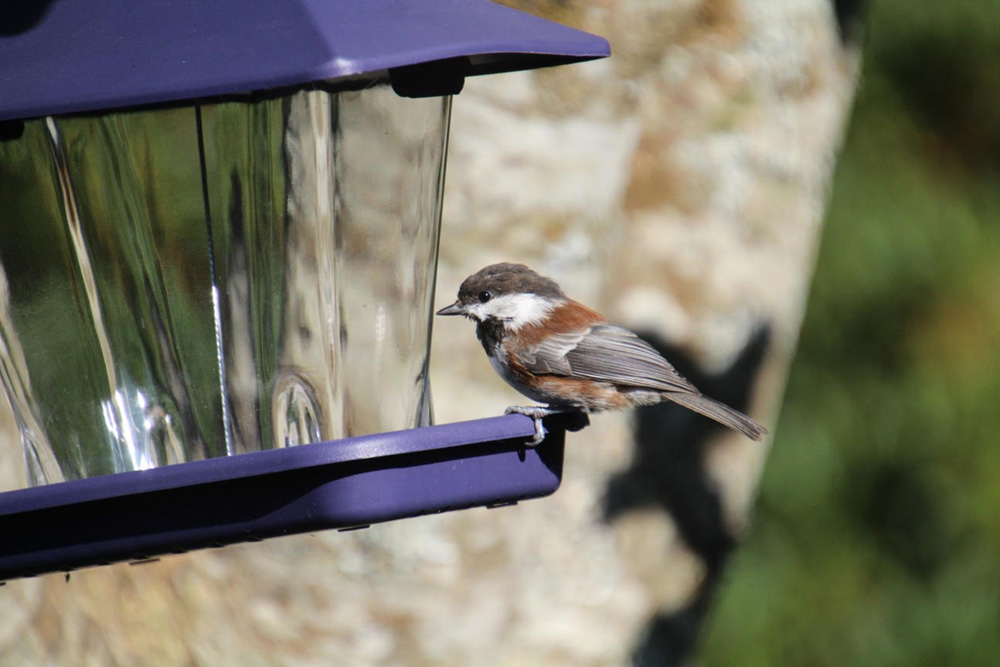Living in or near the Rocky Mountains blessed with parkland, montane and sub-alpine vegetation zones, Albertans are sharing the world with three different species of chickadees. Now you must understand that chickadees, a bird with a merry song, “cute” in appearance and having a high tolerance of we “carbon-based units”, certainly brighten up any winter day. Social in nature, it’s not unusual to see chickadees taking sunflower seeds from the palms of children and adults. A primal connection with nature is that gift in return from the chickadee. Depending on where you travel in the area, you may see just one species, the black-capped chickadee. If you head to the west end of Calgary and beyond, you can triple the experience and see the classic black-capped as well as the mountain and the boreal chickadees, often flying and living within the same treed areas.
These chickadee species have many similarities. They on average, are between 4.5” to 5.5” in length and weigh a mighty half of an ounce. Each shares a dark, distinctive head mask, dark colored crowns, with unique variations and a two-colored buff body. The Alberta trio also sports a black throat patch of varying size. Each also stores food in nooks and crannies, meaning of course each has a marvelous memory to find these food caches when needed. All nest in holes or cavities within wood and can reproduce anywhere from 5 to 12 young in a brood. Although we associate chickadees as being seed eaters, their real passion is the consumption of insects, high in protein. Mountain chickadees love caterpillars especially during conifer insect outbreaks like pine beetles and needle miners. One such chickadee had no less than 275 tiny needle miner caterpillars in its stomach. Chickadees on average, beat their wings 27 times per second. Hence the need to consume 10 kcal per day for survival makes chickadees very interested in many food sources in the insect world, as well as a variety of seeds.
As their name implies, the black-capped chickadee sports a black cap and bib, white cheeks and buffy undersides grading to a white beneath. The boreal chickadee has a dark brown cap, small black bib and small white cheek with a medium brown to white buff body. The mountain chickadee looks similar to the black-capped chickadee. Look for the white stripes over the eyes and the dominant buff grey color of the body. All three have unique songs, the boreal having a raspier tone than the commonly heard black-capped chickadee. The mountain chickadee has a fee-bee call within its song. The “dee-dee” portion of a call serves as a warning of predators to other chickadees, especially as the volume of the call increases.
A rarity in Alberta is the chestnut-backed chickadee, much more common on the west coast and on Vancouver Island. As its name implies, its key distinctive difference is the chestnut colored back, with all other features being remarkably similar to our black-capped chickadee. This species may nest in the Waterton Parks area from time to time.
So, now that you have some information about chickadees and a look at some photos taken recently of these most vocal of birds, your task will be to see them within the conifer and aspen tree stands right in area. If you are looking for the “triple”, we recommend a walk through Bebo Grove, located near the west end of Fish Creek Park (13610 24th St. SW). The park is beautiful with numerous pathways to enjoy. Black-capped chickadees greet you at the parking lot. Within the walking loop of Bebo Grove, the “triple” wait for you. You also have a chance of seeing 5 species of woodpeckers, 2 species of nuthatches and Bohemian waxwings that make the trip all worthwhile. Take up nature’s diversity and enjoy a triple delight.






